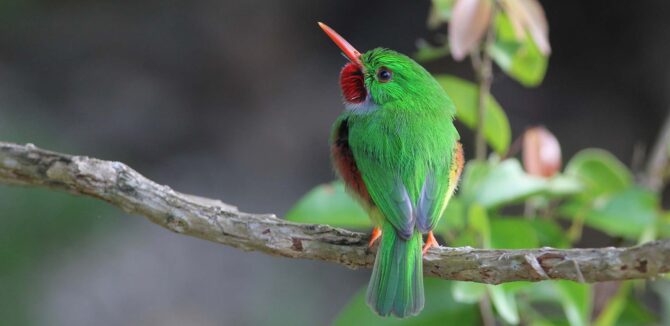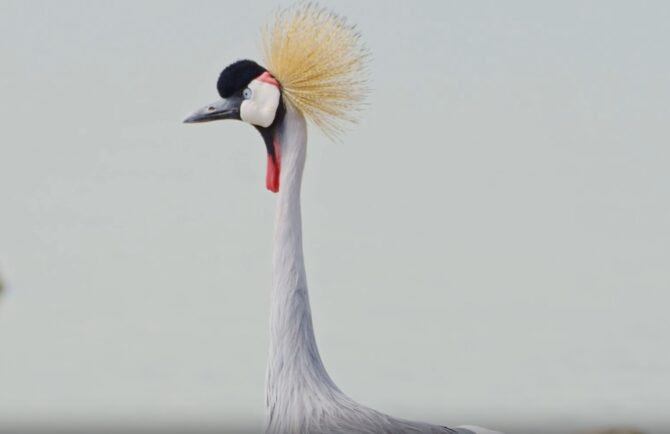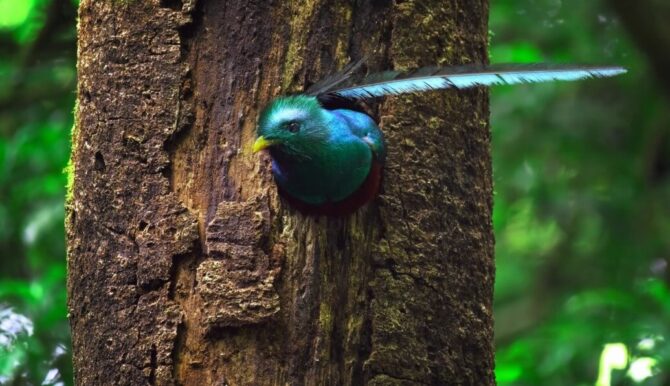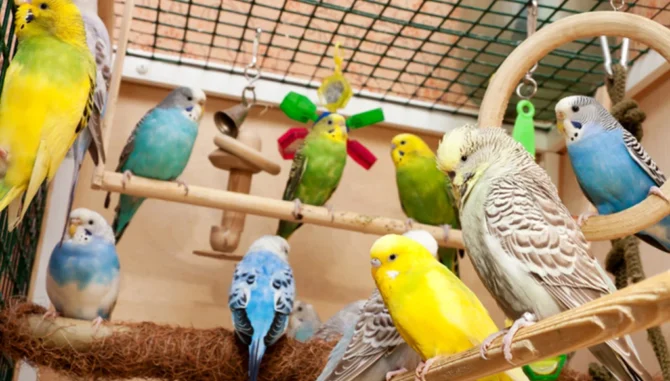Birds display all sorts of behavior, but few are as dangerous as flying into windows.
Not only is the sound sickening, but they can also sustain injuries and even die from it. This is not just a funny behavior to be overlooked.
As animal lovers, we should be willing to help birds from injuring themselves. Of course, this help starts by answering the question: Why do birds fly into windows?
The answer isn’t complex, but it can be sad when you think about it. Birds do not fly into windows on purpose.
When they look into the window and see the reflection of your yard or the skies, they do not realize it’s glass and want to fly through. They may also see light reflecting at night and get pulled to it.
Reports show that the deaths that occur when a bird flies into a window are in the millions and even billions each year.1
While the numbers may not be entirely accurate, it is telling that the estimate is that high.
We’ll look further into the reasons birds fly into windows and how to prevent it for the safety of our avian friends.
Why Do Birds Fly into Windows?
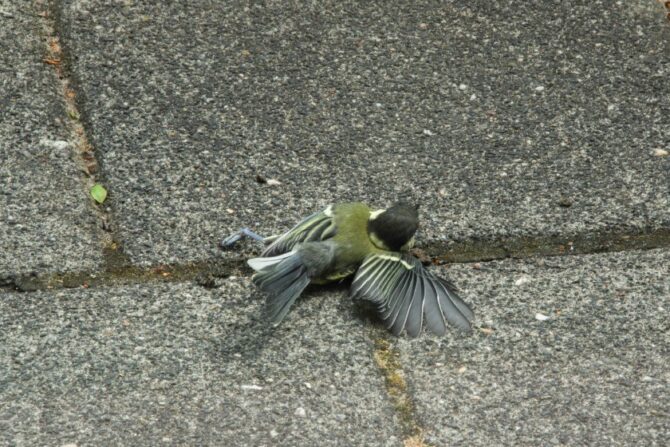
There are two broad categories of birds, diurnal and nocturnal birds.
Both groups have their reasons for flying into a window, and it might have been silly if it wasn’t a serious issue.
Diurnal birds fly into windows because they see a reflection of a yard, a tree, or the skies.
Not realizing that it is glass (glasses do look invisible), they try to fly through it, resulting in a crash.
This is somewhat similar to how a lot of us assumed there was a world behind mirrors in childhood. Birds make this assumption, only they take it so real that they want to go through it.
Another reason a diurnal bird gets drawn to a window is when it sees a reflection of itself and tries to fight it.
In this case, it doesn’t crash into the windows. You’d only hear its beak poking at the glass.
Birds are territorial, and any strange bird is considered a threat, even themselves!
Nocturnal birds face a different challenge. Windows reflect light, and for some reason, the light draws them closer.
This especially happens to migratory birds, and as a result, they either collide with the window or themselves.
Some nocturnal birds also get diverted from their path with this light, then crash into the windows during the daytime as they seek to “migrate” through.
Do Windows Harm Birds?
Some birds leave without any harm, while others aren’t so lucky. It most likely depends on how fast the bird was moving when it crashed into the window.
Unfortunately, birds often move fast, which means the crash leaves an impact.
Some birds die on the spot, some end up with broken wings, some fly away only to die later from internal bleeding, and some end up stunned, leaving them vulnerable to predators like your pet dog.
What Should I Do if a Bird Flies into My Window?
If you hear the thud and realize it’s an unfortunate bird that crashed in your windows, ensure you check it out.
Watch to see if the bird flies away without a hitch. If it does, then it’s off your hands.
If it doesn’t get up but remains injured. You can either step in to help or contact a wildlife rehabilitator.
The latter is a preferable option if you aren’t fully acquainted with the laws of your state.
If you notice the bird has died, you can either leave it for nature to give it a burial or bury it yourself.
Some states and countries frown at burying creatures, so again be familiar with the laws governing the place you’re at.
Some individuals also opt to remove the cadaver from their property to avoid predators coming in.
Steps to Prevent Birds from Hitting Your Windows
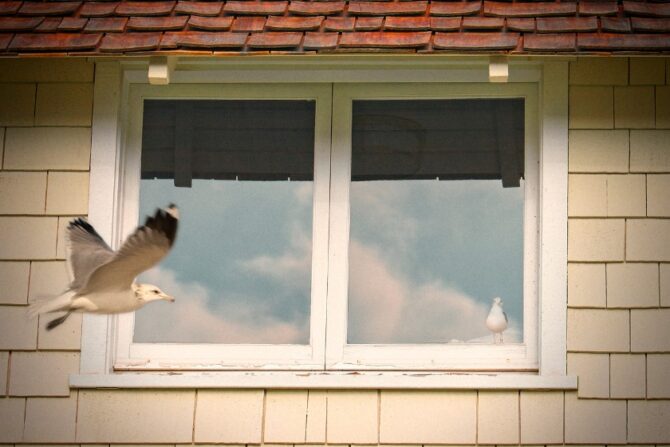
Just as we stated above, it is our duty as animal lovers to protect these avian creatures. Thus, you should find ways to prevent this behavior.
Here are some steps to follow:
- The first step is to identify the more problematic windows. Not all pose the same problems to birds as they are placed in the shadows. Observe each window and identify the ones that reflect trees, your yard, or the skies. If a bird has hit the window before, that’s a dead giveaway.
- Put screens or decals outside the window, not inside. Putting the screen or decal inside will not stop the windows from reflecting. When outside, you have better chances of covering up the problematic window.
- Another way to prevent or stop this behavior is with bird tapes. These tapes serve as a barrier and a scare tactic for driving away birds. Bird tapes are an effective tool for repelling birds without harming them.
- You can also install a transparent film to make the glass visible to the birds. One of the greatest dangers of glasses is that it’s invisible. The transparent film can help remedy that.
- Put up a window warning to deter the bird from approaching. The window warning looks like tufts of feathers that discourage the bird from moving closer.
- Try not to keep bird feeders or bird baths too close to the problematic windows. They can either be 3 feet or even more than 30 feet away.
- Paint patterns on the outside of your windows with soap or tempera paint. This makes the windows visible.
- Besides outdoor solutions, make a few changes indoors. For example, you can keep your curtains closed if it’s not necessary to keep them open. Keep your lights off at night too.
- Install a motion sensor light outside at night, as this makes nocturnal birds less disoriented.
- Keep birds in mind when building or remodeling. One way to do this is by using fritted glass windows, UV reflective ones, or angled ones.
Wrap Up
Glass is a subtle enemy of birds, and while it isn’t as dangerous as predators like cats, glasses are responsible for the injuries and deaths of so many birds.
With the solutions we’ve provided in this article, you could at least reduce the number of times birds hit your windows.
Inform your neighbors too on taking precautionary measures to protect birds.
Next up…
- 15 Biggest Birds In The World
- 15 Birds That Look Like Robins But Aren’t
- 30 Purple Birds List
- 30 Beautiful Birds With Mohawks
References & Notes
Facts Sources:
- McDonald C. 2013. How many birds are killed by windows? BBC.

